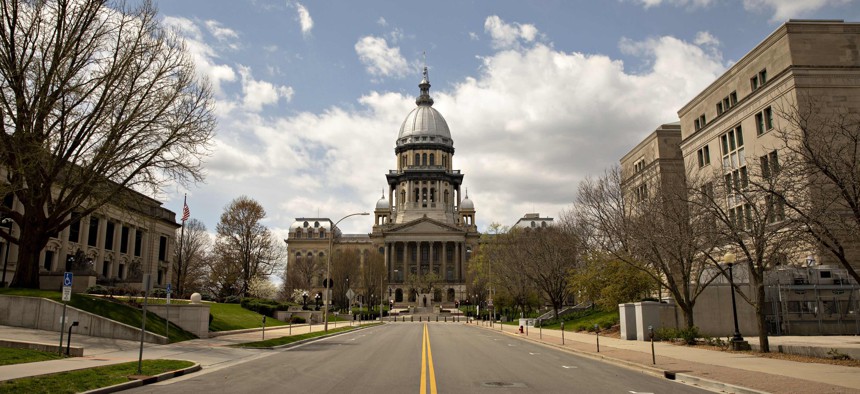Former State Lawmakers Fail in Fight to Clawback Pay They Voted to Cut

The Illinois State Capitol in Springfield, Ill., with the Illinois Supreme Court building to the left. Daniel Acker for The Washington Post via Getty Images
The Illinois legislators boasted that they slashed their salaries during the Great Recession. But they later went to court to get back raises they missed out on.
Two former state legislators who voted for—and later bragged about—cutting their own pay cannot challenge the law that reduced their salary eight years after the fact, the Illinois Supreme Court ruled Thursday.
If the court had ruled the other way, the state could have had to dole out $10 million or more in back pay to former legislators, according to the state comptroller’s office.
The two former Illinois state senators who brought the case, Michael Noland and James Clayborne, argued that laws they helped pass starting in 2010, during the depths of the Great Recession, violated the state constitution. They contested laws that reduced their salaries and eliminated cost-of-living increases that would otherwise have been automatic.
Illinois’ state charter, like many others, does not allow legislators’ salaries to change during the two-year term that sitting lawmakers have been elected to.
But the state’s high court, in a 17-page opinion, ruled that the former legislators waited too long to challenge the pay cuts. They waited so long, the justices ruled, that courts shouldn’t even consider their claims about the constitutionality of those laws.
“The lack of due diligence in plaintiffs’ assertion of their claim is readily apparent from the record, in that it is undisputed that plaintiffs waited to file their action until eight years elapsed following enactment of the fiscal 2010 Salary Reduction Laws and all subsequent enactments,” Justice P. Scott Neville, Jr. wrote for the court in a unanimous decision.
The long delay allowed the state comptroller, who was named as a defendant in the case, to assert a legal defense known as “laches,” which is designed to prevent litigants from bringing lawsuits over long-passed controversies. A lower court ruled that the comptroller couldn’t use that defense, because the former senators were bringing a case in their official capacity that would affect the public policy of the state.
The Illinois Supreme Court disagreed. The justices concluded that, because both of the legislators had since retired, the case was about their private rights, not public concerns.
“Here, plaintiffs, who are suing in their individual and not in their official capacity, have slept on their rights, and we will not come to the aid of such complainants,” the court ruled.
The court explained that Comptroller Susana Mendoza had already spent the money that the former legislators sought to recover. Mendoza “expended money from the legislators’ salaries to pay state obligations for previous years, for the public good, while plaintiffs sat idle and did nothing,” Neville wrote.
The lawmakers also benefited by initially refusing their salaries, Neville noted.
“Here, plaintiffs, with the power to set their own salaries, introduced, sponsored, endorsed, voted for, publicly touted their sponsorship of, and acquiesced to the reduction in their statutory salaries. Indeed, they may have benefitted in their reelection endeavors in part, based on their championing of this position of a decrease in salary for the benefit of the public good of the State of Illinois in a time of monetary need,” Neville wrote for the court.
“The public was misled by these plaintiffs when, soon after retiring from office or indicating an intention not to run for retention, plaintiffs filed this lawsuit,” he added.
He also pointed out that the underlying laws “were never found to be unconstitutional and remain in effect.”
Mendoza, the state comptroller, praised the court’s decision in a statement Thursday.
“I’m so grateful the Supreme Court said ‘No’ to these two former legislators who voted to forego their raises, then issued news releases praising their self-sacrifice in declining those raises as they asked their constituents to re-elect them,” she said.
“Years after they left the legislature, they shamelessly sued me—and by extension, you, the taxpayers—saying they had no constitutional right to decline those raises and wanted them back,” Mendoza added.
Noland is now a trial judge in the Chicago suburbs, while Clayborne is an attorney in private practice near St. Louis
Daniel C. Vock is a senior reporter for Route Fifty based in Washington, D.C.
NEXT STORY: Detroit Sues the U.S. Census Bureau Over Alleged Undercounts






